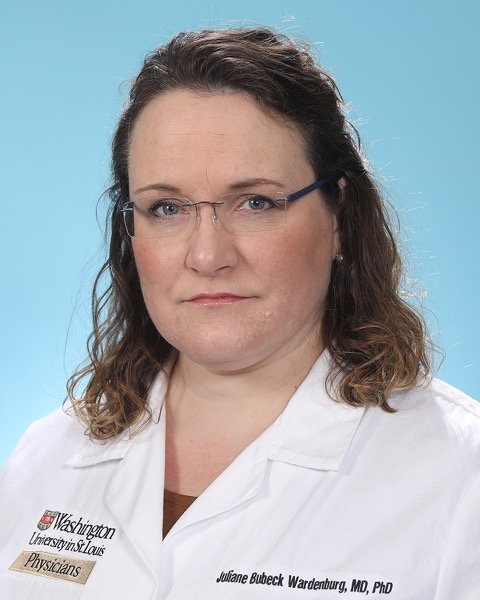
Juliane Bubeck-Wardenburg, MD, PhD
Professor
Washington University School of Medicine in St. Louis
Disclosure(s): Aridis Pharmaceuticals: I have a financial agreement with Aridis Pharmaceuticals related to patents owned by the University of Chicago; Forward Defense, LLC: I may receive royalty income based on a technology developed in my laboratory that is currently owned by Washington University and subject to licens, Ownership Interest
I am currently the Donald B. Strominger Professor in the Department of Pediatrics and Chief of Pediatric Critical Care at Washington University. Upon completion of my M.D. and Ph.D. degrees in Immunology from Washington University in St. Louis, I pursued clinical training in General Pediatrics and Pediatric Critical Care at the University of Chicago. During this time, my research came to focus on the pathogenesis of Staphylococcus aureus infection in the laboratory of Dr. Olaf Schneewind in the Department of Microbiology as a Pediatric Scientist Development Program Fellow. Since 2008, my independent laboratory has investigated the role of bacterial toxins in perturbation of host cellular and tissue homeostasis. My research group has made seminal contributions to understanding the pathogenesis of S. aureus disease. We identified ADAM10 as the long-sought cellular receptor for S. aureus alpha-toxin, revealing the molecular mechanisms by which the toxin-receptor complex produces the defining pathology of severe staphylococcal infection. This observation challenged the dogma that pore-forming bacterial toxins bound membrane lipids, prompting the rapid identification of proteinaceous receptors for the entire family of S. aureus pore-forming toxins. More importantly, this work has provided the intellectual rationale for neutralization of alpha-toxin as a strategic goal in prevention and therapy of human S. aureus disease. Extending our studies in toxin biology, my laboratory has also investigated Bacteroides fragilis toxin (BFT), a zinc-dependent metalloprotease that is structurally and functionally related to ADAM10. We have defined the mechanism of BFT activation, revealing the importance of this toxin in life-threatening infection. My laboratory analyzed determinants of B. fragilis niche acquisition in the colon, demonstrating the ability of a genetically-defined probiotic to mitigate toxin-mediated disease. These studies were the first to reveal the genetic specificity of intra-species competition within the colonic microbiome. I have been fortunate to receive a number of honors for these contributions, including the Society for Pediatric Research Young Investigator Award, the University of Chicago Distinguished Investigator Award, appointment as a Burroughs Wellcome Investigator in the Pathogenesis of Infectious Diseases, and election to membership in the American Society for Clinical Investigation and the American Academy of Physicians.
My primary career goals are two-fold: first, to continue to advance the field of bacterial toxin biology relevant to human disease. Broadly, this entails a continuation of my laboratory’s efforts to define novel attributes of the host-pathogen interaction as an internationally recognized leader in the utilization of molecular microbiology and host genetics to examine disease. Specifically, our research findings have positioned me to advance an infant and pediatric vaccine targeting S. aureus in order to elicit population-level immunity. I see this as a fundamental opportunity to change human disease, and am therefore pursuing this through continued research and advancement of a novel vaccine down the path of product development and clinical trials. Second, I intend to continue to impact the field of pediatrics through my ability to influence the vital contribution of pediatricians to patient care and research. As a division chief, I have had the opportunity to support the development of a diverse array of faculty and trainees that exhibit leadership locally in the ICU and department, and nationally/internationally through their research contributions that span both clinical and basic science. I see on a daily basis the impact that they have on care of the critically ill child and on the future of our field; concurrently, I recognize the threat that the pressures of modern-day medicine place on the foundation of academic pediatrics. I intend to utilize my talents throughout my career to ensure that this foundation of daily care for infants and children – and the potential to change disease through inquiry – remains strong within our field. I recognize that continually advancing this goal throughout my career may lead me down any number of paths within academic leadership.
Poster(s):
-
Friday, October 18, 202412:15 PM - 1:30 PM US PT
